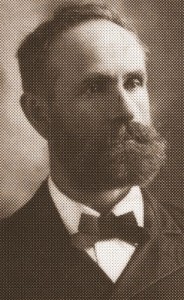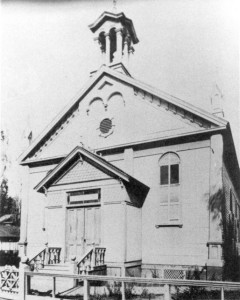Rabbi-Cantor Herman (Kantorowitz) Davidson
Values Codes I – H – E – L
Herman Davidson was born in 1846 in the Russian village of Kapulya, Gubernia Minsk.
He received thorough training in Hebrew liturgy from his cantor-father, Nathan Kantorowitz.
As Herman matured, he developed a fine baritone voice, which earned him a brief pupilship under Salomon Sulzer of Vienna, the father of the modern cantorate.
Along the way
Herman obtained a spot with a touring Russian opera troupe, which enabled him to evade conscription in the Russian Army.
While with the opera, Herman Kantorowitz changed his name to Herman Davidson.
The troupe performed in venues across the United States during the 1870’s.
Herman Davidson was so appalled by the gun toting he saw in the Wild West that he left the opera, while in Texas, and headed for San Francisco.
There, he became friendly with several Rabbis in the city.
Stockton
Rabbi Albert S. Bettelheim of Congregation Ohabai Shalom in San Francisco suggested that Herman lead the 1876 High Holy Days at Congregation Ryhim Ahoovim of Stockton, later known as Temple Israel.
Although he had neither training as a rabbi nor a cantor, the congregation was pleased with his performance and hired him to fill both positions.
Rabbi-Cantor Davidson had an Orthodox background, which fit with the congregation’s original designation as a Polish-Orthodox synagogue. However, the services did feature some non-traditional elements, including an organ, mixed choir, and mixed seating.
Stockton fell on hard economic times in the mid-1880’s, and dues stopped coming in from the temple’s membership.
They could no longer afford Rabbi-Cantor Davidson, so he returned to Russia to be with his family.
When Davidson returned to Northern California, he briefly served as a cantor in San Francisco before being re-hired at Temple Israel at a reduced salary.
Temple Israel officially joined the Reform movement in 1892, largely to replenish its drastically shrinking membership.
Although the board of directors consisted of Davidson’s friends, they felt it necessary to criticize him and push him out of the job.
The most substantive complaint was that Davidson’s poor command of English made him incapable of communicating with younger, non-European-born congregants.
Rabbi-Cantor Davidson left the Temple Israel in 1896.
The President nearly hired Miss Ray Frank, a noted lecturer, for the vacant rabbinical post — an unsuccessful effort that would have had a major historical impact.
Temple Israel ended up hiring Rabbi Rudolph Farber.
Rabbi-Cantor Davidson was made leader of Ahavas Achim, a new congregation comprised of more conservative Stocktonians.
Family
In 1897, after ten years of courtship, Herman Davidson married Carrie Snow of Placerville.
They had one son and named him Samuel.
Rabbi-Cantor Herman Davidson passed away in 1911, a few months after conducting Samuel’s bar mitzvah.
He is buried at the cemetery of Ahavas Achim in French Camp.
Source
- Reva Clar, “Rabbi Herman Davidson: Early Stockton Jewry and Its Cantor-Rabbi Herman Davidson, Part 1,” Western States Jewish Historical Quarterly 5/2.
- Reva Clar, “Rabbi Herman Davidson: Early Stockton Jewry and Its Cantor-Rabbi Herman Davidson, Part 2,” Western States Jewish Historical Quarterly 5/3.
- Norton B. Stern, “Rabbi Herman Davidson: Pioneer Rabbi of Stockton, CA,” Western States Jewish History 41/4.
Jonathan Friedmann is curator of this Rabbi-Cantor Herman Davidson exhibit.
=============================================
Jews in the News
About this Time
A Synagogue for the Mother Lode
Fiddletown, California, June 29, 1857
Mr. Editor:
Finding occasionally in your worthy sheet, short communications from the interior, to which you freely give space, I will drop you a few lines, and hope they will find insertion, provided you find them of interest to your readers.
If it is still in your memory, you undoubtedly know that our brethren in this vicinity concluded last year to erect a synagogue in Jackson. The last meeting of the congregation was held the 18th instant, when it was finally resolved to commence its erection soon; dimensions and style were agreed upon, and, not desiring to incur any debts, it was concluded to erect a frame building, twenty-six feet front, by fifty feet deep, and sixteen feet high; which will probably have an arched ceiling. The inside fixtures will not be very expensive, yet they will be tastefully finished. It will be placed entirely out of danger from fire, and not very distant from the burying ground belonging to the congregation.
It will, if I am not mistaken, be the first synagogue erected in a mining place, and though the use for such is but a few days in the year in the country, yet it is to be hoped that other localities will also endeavor to give permanency to our faith in this country; and I have no doubt but that every true member will willingly lend an assisting hand to any enterprise that will aid in improving our religious state, if not above, at least to an equal with others.
And since California is no longer considered a temporary home, which is evinced by the constant arrival of Jewish families, I can see no cause why a large mining district cannot as well afford a structure, even for the few days we are celebrating, as well as small settlements, with few inhabitants, can have their church. It would undoubtedly improve the religious and moral state, increase sociability, and, in short, would bring the “Sons of Israel,” scattered as they are in this State, to a closer unity, one which should exist among Jehoodism [sic].
If I am not transgressing upon your limited sheet, allow me in behalf of the Jackson congregation to hereby tender our best thanks to all our friends who favored us with their liberal donations. I can assure them their gifts are usefully and carefully expended, and if they should ever require our support in similar circumstances, we shall consider it as a duty to extend them liberal aid, should it even benefit those in their midst, who rather than support it avoided our request.
Yours, etc.,
M. Raphael
— The Weekly Gleaner, San Francisco, July 17, 1857 [WSJHQ 7/3]
=============================================

